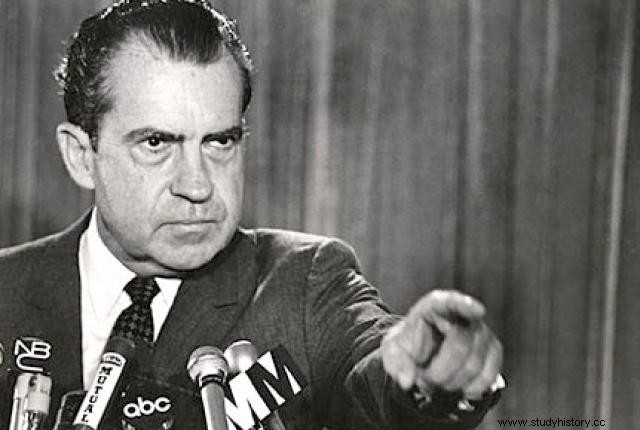At the Republican National Convention held in Miami on August 5, 1968, Richard Nixon he was elected candidate for the presidency of the Republican Party after defeating Nelson Rockefeller and Ronald Reagan. For its part, the Democratic Party, after the refusal of the president in office Lyndon B. Johnson , chose as a candidate the vice president Hubert H. Humphrey . Elections were held on November 5, 1968:Nixon obtained 31,783,782 votes (43.42%), Hubert H. Humphrey 31,271,839 (42.72%). and George Wallace 9,901,118 (13.53%) -the latter for the American Independent Party, recently created as a split from the Democratic Party for being against the political measures of racial equality promoted by Lyndon B. Johnson-. On January 20, 1969, Nixon was appointed President of the United States... and this is the clean part of the story, but there is another gray part - not to call it black - that was unknown until 2008 when the telephone conversations of Nixon were declassified. President Johnson in 1968.
In the first years of the Vietnam War, the US Army was totally convinced of the need for that war and was united and disciplined. As the war dragged on, morale and discipline deteriorated. The same thing happened among the American civilian population, who watched the horrors of the first war broadcast by the media. By 1968, 30,000 US soldiers had died and anti-war demonstrations spread across the country. Months before the elections, Lyndon B. Johnson had been in contact with Nguyen Van Thieu , the president of South Vietnam, to stop the bombing of his northern neighbor and to start peace negotiations. If Johnson managed to stop the war, the Democrats would win the elections again... and Nixon knew this . So, through Republican adviser Anna Chennault she (born Chen Xiangmei and naturalized American when she married Claire Chennault) she contacted the South Vietnamese ambassador to the US to stop those talks. They sent Nguyen Van Thieu the message that with Nixon they would not have to make any concessions to North Vietnam and that they would defeat the Vietcong. After resuming the talks, President Johnson realized that his Vietnamese counterpart was no longer as receptive as on previous occasions... Until the FBI found out .

Richard Nixon
The FBI was tapping the phones of the Vietnamese embassy in the US and was able to find out about the conversations held by Nixon's adviser with the ambassador. From the president's declassified telephone conversations with several members of his government and even with Everett Dirksen, the Republican leader in the Senate, fragments are extracted in which he calls Nixon a traitor and accuses him of…
having blood on your hands for not wanting to stop the war
In another conversation, Nixon, worried that Johnson would make his betrayal public, called the president, denying everything and accusing third parties. The president brings it to the attention of Hubert H. Humphrey, his vice president and presidential candidate for the Democratic Party, in case he wanted to make it public. The latter, confident in his victory and because of the damage it would cause to the nation, decided not to use him... that decision and the split of his party led by George Wallace cost him the presidency by less than 1% of the vote. When Nixon was elected president, this whole story was covered up... although other listenings, those of the Watergate case , cost him his resignation in 1974 -the only case of an American president leaving office-.
